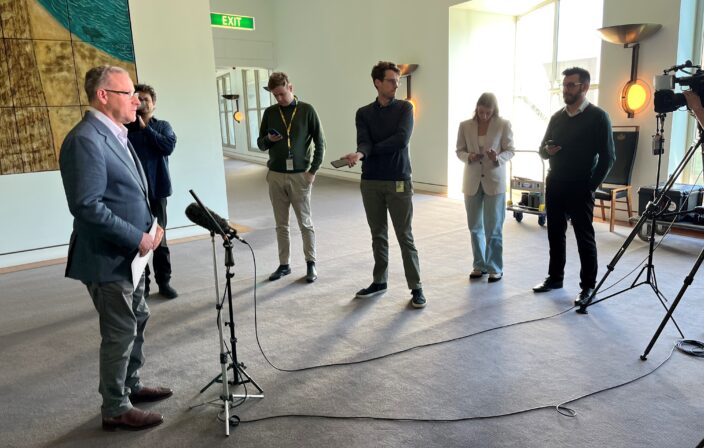Andrew McKellar interview with Matthew Doran, ABC News Afternoon Briefing
10 Nov 2022
|Transcripts
Event: Andrew McKellar interview with Matthew Doran, ABC News Afternoon Briefing.
Speakers: Andrew McKellar, chief executive Australian Chamber of Commerce and Industry; Matthew Doran, host ABC News Afternoon Briefing.
Date: 10 November 2022.
Topics: Secure Jobs, Better Pay Bill; industrial relations campaigning.
E&OE
Matthew Doran, host ABC News Afternoon Briefing: Andrew McKellar, welcome to Afternoon Briefing. Your position on this Bill seems to be pretty consistent. We are now at this stage where all of these amendments have been presented. The government trying to get this done as quickly as possible. You’re still having some serious concerns about how it plays out?
Andrew McKellar, chief executive Australian Chamber of Commerce and Industry: Hi, Matt. Good to be with you. Look, absolutely. Business, I think, is very concerned about the impact that this legislation will have. We are very concerned that government is absolutely rushing this through. They’re not giving the parliament; they’re not giving the Senate the time for an open and transparent review of it. And the more we look at it, I mean, we’ve seen 30 pages of amendments today. This is complex legislation. It’s imposing very significant requirements on business and on employees. It is really a big risk that the government is taking with this legislation. We’re very concerned about the impact this is going to have on small and medium-sized business in particular.
Matthew: We know that this Omnibus Bill, there are a wide range of measures contained in it, going from the contentious parts like multi-employer bargaining through to areas where it seems certainly in parliament, there’s support for it. Are there any areas where ACCI is happy with this bill?
Andrew: Look, there are parts of the legislation which are less controversial and which I think business would be happy to see being passed. So, where we’re talking about issues of gender pay equality, support for lower paid workers. Obviously these are issues where business is much more flexible in ensuring that we get some outcomes and where the government has a clear mandate, then those are issues which are going to be less controversial. But it’s very complex legislation. It is imposing very different requirements on business. It’s a fundamental change to the approach to bargaining, in particular this so-called single interest stream, is something that is not fit for passage at the moment. And it’s not just business that’s saying that. Leading labour market economists, academics are saying that it’s not ready, it hasn’t been cooked properly. We’ve got to look at it much more carefully. It shouldn’t be being just forced through the parliament in the way it is.
Matthew: For people at home who don’t actually understand what that stream issue is, can you explain it in layman’s terms?
Andrew: Look effectively, this so-called single interest stream is creating a new arrangement of multi-employer bargaining. So, bringing together different businesses with different characteristics, whether they’re in the same location, whether they are similar types of businesses, whether they’re under the same regulatory regime, trying to push them together into a single one size fits all agreement. And it’s not voluntary. In a lot of cases, businesses can be simply co-opted, forced into these agreements against their will, imposing significant costs, putting at risk jobs as a result, resulting in higher costs, feeding back into inflation, which will only lead to higher interest rates. It’s not good for the economy, it’s not good for employment. It’s not good for small and medium sized businesses, and it’s not fit for passage.
Matthew: There’d be people out there, cynics, who would say, “Well, the business community would say that, wouldn’t they?” Are we scaremongering here?
Andrew: No, we’re not. I think the fact that you are seeing so many different business groups coming out now and raising their concerns about that. Even some groups that initially were prepared to entertain these ideas, they’ve looked at the legislation, they’ve seen what it delivers, they’ve seen the risks in it. And now across the board, we’ve got very clear views from really all in the business community saying, this is a risk that we cannot afford to take.
Matthew: So, what’s the next step from here? Because it seems like the government is going to continue pressing on with this proposal. We’ve had members of the resources sector suggest that an anti-bill advertising campaign could be in the works. Is that something that your organisation would back?
Andrew: Well, we want to see the parliamentary process play out. Clearly, the Senate will be very important here. We’re speaking very actively with all of the senators with the crossbench in particular. So, there’s a lot of pressure on them. Everyone is beating a path to their door. We think the Senate needs the opportunity to have an open and transparent inquiry to get detailed submissions to make their own assessment. But if the government wants to force this to a vote before Christmas, then we would urge them to oppose the bill. If they want to try and split it, let’s see how that comes out. That will be very difficult. But it’s not fit for passage at the moment and obviously we hope that the Senate will have the opportunity to be able to look at this and make its own mind up.
Matthew: But other than lobbying politicians and speaking to us here on the ABC where you are, of course, always welcome, how do you push that message in the public? Are we ramping up for some sort of public campaign here, pulling apart or ripping apart this bill?
Andrew: Well, I think, let’s take that one step at a time. We’re out consulting with our members. We’re trying to inform them about the impacts. We’ve got to do that first. That’s our responsibility. We’re talking to members of parliament. We are communicating in public on this issue. We’re not being silent. Whether we get into paid campaigns or those sorts of things in the future, I think, let’s see how this goes. The union movement, when it’s come to these issues, has never hesitated to take that step. So, I think, we want to have an open, transparent, responsible, mature discussion with government on this legislation, but if the government is going to insist on ramming this through, then I think business is entitled to put its perspective into the public domain.
Matthew: Andrew McKellar, thanks for joining us.
Andrew: Thanks very much.


